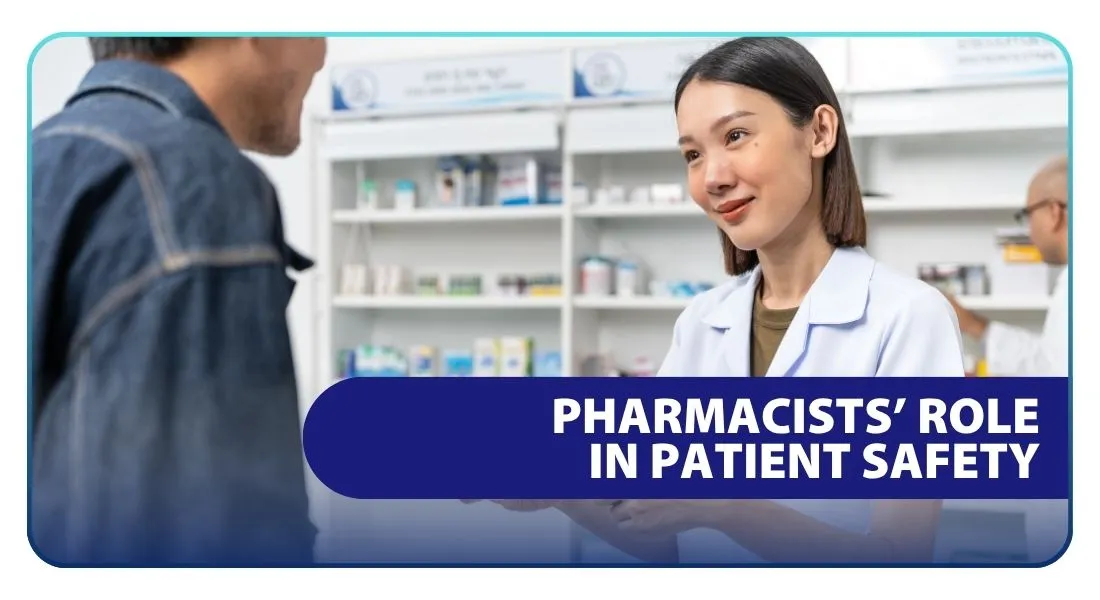Pharmacists play a key role in promoting and improving patient safety in partnership with other healthcare professionals. While there are many actions pharmacists take in contributing to optimal health outcomes, we also highlight certain routinary yet important actions by pharmacists in their daily practice.
|
Safety action |
What is involved |
Example of impact |
|
Ensuring medication access |
Making sure patients can get the medications they need
|
Recommending suitable alternatives for unavailable medications, and/or identifying appropriate patient assistance programs for patients who might be unable to afford medications |
|
Improving medication adherence and administration |
Helping patients take medications as prescribed by their physicians
|
Reviewing how patients are taking their medications, including the dose and duration of therapy, as well as preparation and storage to help ensure safe and accurate medication intake |
|
Supplying medication information |
Sharing information with patients and/or caregivers so they can take medications safely and effectively |
Counseling and educating patients and/or caregivers on important information (e.g., medication's use and expected benefits, potential drug-drug/food interactions, and precautions to be observed) can contribute to positive outcomes, including prevention of risks related to adverse drug reactions |
|
Evaluating medication appropriateness |
Assessing each medication to ensure safe and effective treatment options for the patients |
Taking into consideration relevant medical history, concomitant medications and therapies, and collaborating with other healthcare professionals, thereby allowing the implementation of interventions to promote appropriate clinical drug use |
|
Medication safety monitoring |
Detecting, assessing, understanding, and preventing adverse effects or any other drug-related problems |
Continuous monitoring and evaluation of drug safety to ensure that the benefit of a medicine outweighs its risks, leading to updated product information, reduced harm to patients, and improved public health |
As healthcare becomes increasingly complex, utilizing the skills and expertise of the healthcare workforce is essential, and there are various roles where pharmacists can actively participate to help improve the outcomes and strengthen patient safety.
At Unilab, we live by our promise of Unilab Quality Alaga—a long-standing commitment to go above and beyond in delivering trusted, quality health solutions that Filipinos can afford to maintain. Each medicine or vitamin we make has the four marks of Unilab Quality Alaga: subok at napatunayan, ayon sa standards, sinuring mabuti, at gawang world-class. We recognize that this promise of quality and care is not based on our own merits, but achieved through partners in health including collaborators from the pharmacy profession. Pharmacists have their unique contribution to the seal of Unilab Quality that stakeholders encounter in every step of their health journey. Their tireless work towards ensuring patient safety helps solidify the experience of Unilab Quality Alaga for Filipinos.
Patient safety is a cardinal goal among all healthcare professionals, including pharmacists. Pharmacists’ continued dedication to their profession and their eager willingness to collaborate with other healthcare experts are paramount in guaranteeing patients’ success towards achieving positive health outcomes.
References:
-
Pharmacist's Role in Medication Safety. Patient Safety Network 2024.
-
Pharmacists Play Key Role in Complex Medication Management. Pharmacy Times 2024 Vol. 90 No. 6.
-
American Pharmacists Association. Pharmacists’ Impact on Patient Safety.


